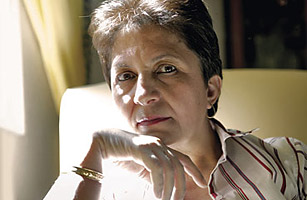
As a writer-activist who has fought for the rights of Muslim women, I thought I knew my fellow bad girls of Islam. But Wafa Sultan, 47, has given new meaning to the word bad. A psychiatrist in Syria before transplanting to Southern California in 1989 with her family, she gave an interview with al-Jazeera a couple of months ago that made her a household name in the Islamic world. "The clash we are witnessing around the world is ... a clash between a mentality that belongs to the Middle Ages and another that belongs to the 21st century," she said. "It is a clash between freedom and oppression."
The interview raced across the Internet and landed Sultan in the New York Times and Los Angeles Times and on CNN. I connected with her anger and pain. She questioned Islam in 1979, when, she says, she witnessed the murder of a professor by men with alleged ties to the ultraconservative Muslim Brotherhood political group. I challenged Islamic traditions after my friend and former colleague Daniel Pearl was murdered in 2002. Both killings were punctuated with "Allah is great." We have differences: Sultan blames Islam; I blame Muslims. But we both believe the Muslim world is in the Dark Ages.
Sultan's influence flows from her willingness to express openly critical views on Islamic extremism that are widely shared but rarely aired by other Muslims. She hopes to publish a book and start a foundation to take the politics out of Islam and "change the mentality of Muslim people." She plans to continue speaking out in Arabic to try to free Muslims from "brainwashing." "I even don't believe in Islam," she says, "but I am a Muslim." By so sharply voicing her beliefs, Sultan crystallizes the mission for the rest of us who want to take the slam out of Islam.
Nomani is the author of Standing Alone: An American Woman's Struggle for the Soul of Islam